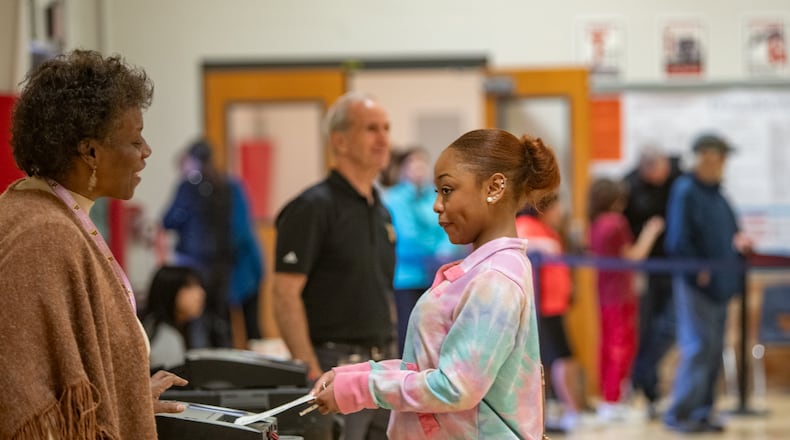Voters turned out in force in the critical swing state of Georgia on Tuesday, a projected record-setting day despite bomb threat hoaxes that the FBI attributed to Russian sources.
The emailed hoaxes forced evacuations of 12 voting locations in metro Atlanta, and police quickly found no evidence of a real danger.
Secretary of State Brad Raffensperger said “Georgia is not going to be intimidated” from participating in such an important election.
Turnout was expected to exceed 5.2 million voters, breaking the state’s previous record of 5 million voters in the 2020 election.
“We understand how polarized America is, and we know how sometimes people want to take advantage of that,” Raffensperger said. “They want to see us mess with each other and not get along with each other. At the end of the day, we are the United States of America. Never lose sight of that.”
Few voters had to stand in lines across the state, with average wait times of less than three minutes, Raffensperger said.
Ryon Horne/AJC
Ryon Horne/AJC
Voting locations targeted by the hoaxes were held open past 7 p.m. in DeKalb, Fulton and Gwinnett counties because of evacuations that interfered with voting. A judge also approved keeping two Cobb precincts open for 20 extra minutes because voting didn’t start on time in the morning.
The bomb threats originated from emails sent to county election officials that contained Cyrillic script, which tipped them off that the threats could be from Russia. The FBI said the emails appeared to originate from Russian domains.
“This is the nonsense,” said Union City Mayor Vince Williams, where two of the evacuated precincts were located. “People are apprehensive on all sides, and sometimes fools will do foolish things. Let’s do what we do as Americans: exercise our right to vote and live with the circumstances after that.”
While voters weren’t deterred by the bomb threats, several said they’re worried about the possibility of violence after the election.
“I am concerned about the transition of power and very nervous about this election,” Tenecia Gober, 59, said after voting at Marietta High School in Cobb County for Vice President Kamala Harris. “Donald Trump doesn’t tell the truth, and after what happened last election with his supporters, I do feel that our country is in danger.”
Max Golshan, a 24-year-old Trump supporter, said he’s hoping for a peaceful transfer of power.
“When Trump was in office, there was peace,” Golshan said. “I just hope that no matter the results, there will be peace.”
Ben Hendren
Ben Hendren
The apparent Russian election tampering followed a video circulated on social media last week that made the false claim that people from Haiti voted illegally in Georgia. Raffensperger called the video “targeted disinformation.”
The Office of the Director of National Intelligence, the FBI and the Cybersecurity and Infrastructure Security Agency said the video appeared to be part of a Russian influence operation.
Voters across the country faced more disinformation on Election Day, including a fabricated video using the FBI’s name and insignia that encouraged Americans to “vote remotely” because of a “high terror threat at polling locations.”
People seeking information about the election or their polling location should turn to their local election office, the FBI said.
Foreign election interference is nothing new, but the volume of attacks has expanded from past elections, said Cliff Steinhauer, the director of information and engagement at the National Cybersecurity Alliance, an organization that advocates for safe technology use and protection from cybercrime.
The threats are primarily aimed at Georgia and other swing states, he said.
“It’s not necessarily red versus blue,” Steinhauer said. “It’s really outside influence, making it seem more divided than I think it really is.”
Voters reported isolated problems Tuesday besides hoaxes and evacuations.
Election officials failed to send absentee ballots to over 3,000 Cobb County voters until last weekend, leaving them little time to get their votes in before Georgia’s deadline when polls closed at 7 p.m.
Meanwhile, a federal judge rejected a Republican Party lawsuit Tuesday that alleged Democratic-leaning counties couldn’t count absentee ballots dropped off at election offices. State law allows voters to hand-deliver absentee ballots until polls close on Election Day.
Chief Judge R. Stan Baker, a Trump appointee, chastised the Republican attorneys for bringing a lawsuit that he called “factually and legally incorrect.”
“It’s dangerous when a nonlawyer makes claims that are factually and legally incorrect about the right to vote,” Baker said. “But for lawyers, it’s more dangerous.”
As of Tuesday, about 344,000 Georgia voters had returned absentee ballots, accounting for an estimated 7% of total turnout.
Nearly 3.8 million people voted in person during early voting, and over 1.1 million voters were expected to turn out on Election Day.
— Staff writers Rosana Hughes, Patricia Murphy and David Wickert contributed to this article.











